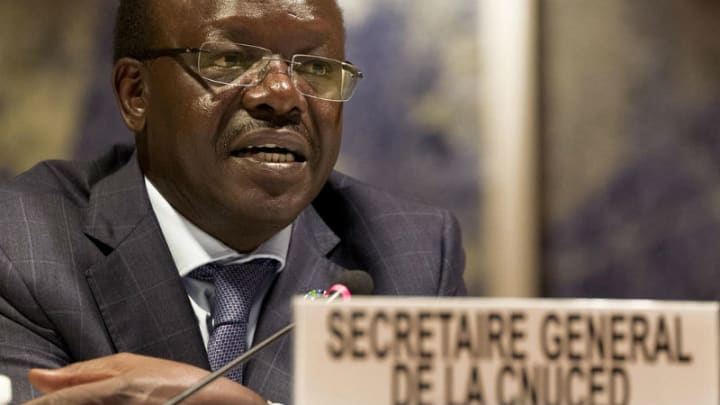
SÃO PAULO, Brazil — Developing countries may see slower gains from trade if “protectionist politicians” continue to take unilateral actions, Mukhisa Kituyi, the secretary-general of the United Nations Conference on Trade and Development told Devex.
“Trade only contributes to development when the results of trade go into social development, when the benefits of trade are spread either by the state or by the inclusion of smaller businesses to many people of society,” Kituyi said in a recent interview. “When you start having disruptions of multilateral trade, you are getting into a situation where the recent recovery of international trade after a decade of depression is disrupted again.”
He added: “And that means that the opportunity that trade was going to serve to reduce poverty is lost. And I think this is the challenge that one sees in this.”
The World Trade Organization, now more than 20 years old, was created to institutionalize a rules-based multilateral trading system that would help to avoid trade wars but also offer an opportunity for small countries to present their agenda or issues, according to Kituyi.
“But the recent outputs from protectionist politicians and unilateral actions like the penalty tariffs that were announced by the U.S. government represent a major threat to that rules-based multilateral system,” he said.
See more related topics:
► What Trump's dumping of trade agreements means for developing countries
► Clues to DFID's economic plans emerge with post-Brexit trade
President Donald Trump has pulled the U.S. out of the Trans-Pacific Partnership, has voiced his disapproval of the North American Free Trade Agreement, which he’s looking to renegotiate, and has imposed tariffs on steel and aluminum. These unilateral actions threaten to undermine WTO, and — along with reactions from China and remaining questions about United Kingdom trade post-Brexit — contribute to an uncertain time for global trade.
While trade wars are “politically interesting” there are rarely winners and they can be disruptive, Kituyi said. “When you have disruptive behavior, the global good will to find common solutions is eroded.”
A shift from multilateral to bilateral negotiated trade agreements favors larger, wealthier countries, he said. Most developing countries simply don’t have the numbers of staff or expertise to negotiate multiple agreements. Moreover, bilateral agreements also disrupt efforts at regional integration. If countries work to create a common market through regional free trade agreements, as 44 African countries did last week, it can complicate that process and the success of those agreements, if for example, the U.S. would give preferential trade access to only one of the members, he said.
“In our advocacy work, we have to pay a lot more attention to understanding what is the basis of the protectionism and how can we deal with the genuine questions that have fueled this protectionism — how can we make globalization a more positive and inclusive force than we have done so far so as to reduce the losers that become vulnerable to this populist manipulation,” Kituyi said.




